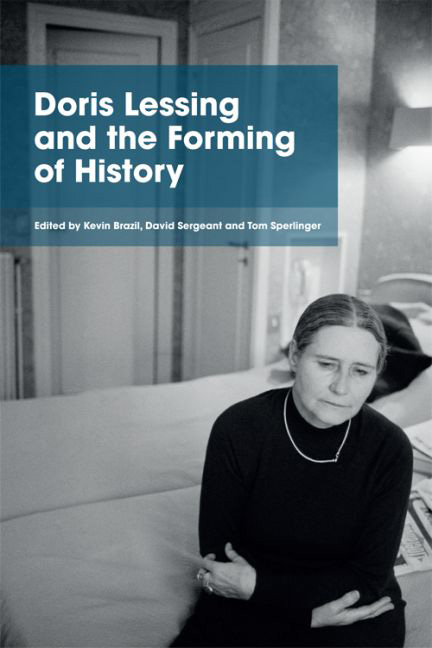Book contents
- Frontmatter
- Contents
- Acknowledgements
- Timeline
- Introduction
- 1 Early Lessing, Commitment, the World
- 2 ‘I'm an adolescent. And that's how I'm going to stay’: Lessing and Youth Culture 1956–1962
- 3 Sequence, Series and Character in Children of Violence
- 4 The Politics of Form: The Golden Notebook and Women's Radical Literary Tradition
- 5 Readers of Fiction and Readers in Fiction: Readership and The Golden Notebook
- 6 From The Grass is Singing to The Golden Notebook: Film, Literature and Psychoanalysis
- 7 ‘funny thing laughter, what's it for?’: Humour and Form in Lessing's Fiction,A
- 8 Lessing and the Scale of Environmental Crisis
- 9 Lessing and Time Travel
- 10 Lessing's Interruptions
- 11 Lessing's Witness Literature
- 12 A Catastrophic Universe: Lessing, Posthumanism and Deep History
- Select Bibliography
- Notes on Contributors
- Index
2 - ‘I'm an adolescent. And that's how I'm going to stay’: Lessing and Youth Culture 1956–1962
Published online by Cambridge University Press: 26 May 2017
- Frontmatter
- Contents
- Acknowledgements
- Timeline
- Introduction
- 1 Early Lessing, Commitment, the World
- 2 ‘I'm an adolescent. And that's how I'm going to stay’: Lessing and Youth Culture 1956–1962
- 3 Sequence, Series and Character in Children of Violence
- 4 The Politics of Form: The Golden Notebook and Women's Radical Literary Tradition
- 5 Readers of Fiction and Readers in Fiction: Readership and The Golden Notebook
- 6 From The Grass is Singing to The Golden Notebook: Film, Literature and Psychoanalysis
- 7 ‘funny thing laughter, what's it for?’: Humour and Form in Lessing's Fiction,A
- 8 Lessing and the Scale of Environmental Crisis
- 9 Lessing and Time Travel
- 10 Lessing's Interruptions
- 11 Lessing's Witness Literature
- 12 A Catastrophic Universe: Lessing, Posthumanism and Deep History
- Select Bibliography
- Notes on Contributors
- Index
Summary
The mid-to-late 1950s saw an explosion of youth subcultures in Britain – teenagers, Teddy Boys, jazz fans, hipsters, beatniks, mods and rockers, each of which generated a combination of moral panic and media fascination. In Doris Lessing's writing in the late 1950s and early 1960s youth is a recurring theme, including in her plays Each to His Own Wilderness (1959) and Play With a Tiger (1962), her critical essay ‘The Small Personal Voice’ (1957), and her novels A Ripple From the Storm (1958) and The Golden Notebook (1962). This chapter will trace Lessing's engagement with youth culture in her writing and argue that she articulates concerns within the New Left and British culture more broadly and reveals some of the tensions and fears concerning youth, while holding on to the hope that youth could still offer a committed and collective form of resistance to dominant ideologies. Her work will be read against contemporary cultural commentary from the New Left, and against other fiction and commentary on youth from the period, including works by Lynne Reid Banks, Anthony Burgess, Shelagh Delaney, Nell Dunn, Richard Hoggart, Colin MacInnes, Alan Sillitoe and Muriel Spark.
The British New Left were split on whether to see these new youth groups as indicative of a consumer-led Americanisation of traditional working-class British culture or as potential sites for cultural (and political) rebellion. Several writers associated with this group entered this debate about the economic and cultural contexts for the rise of youth subcultures in the 1950s, including Derek Allcorn, Michael Kullman, Stuart Hall, Clancy Sigal, and on the margins of this group Richard Hoggart, Colin MacInnes, Alan Sillitoe, Colin Wilson and Lessing (see Bentley 2005). All of these writers were interested, to differing degrees, in the way that the 1950s economic boom was changing established frameworks of social class in both cultural and political terms, and, in particular, how this trend was affecting youth (Allcorn 1958; Kullman 1958; Sigal 1958; Hoggart 1957; Hall 1959a; Williams 1961; MacInnes 1959).
- Type
- Chapter
- Information
- Doris Lessing and the Forming of History , pp. 26 - 38Publisher: Edinburgh University PressPrint publication year: 2016



